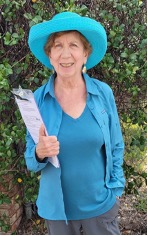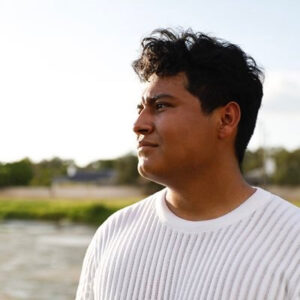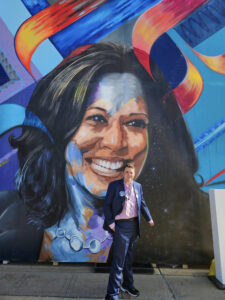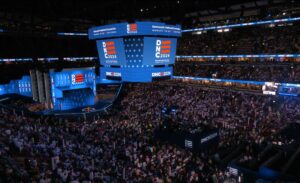Spirits were high, despite the protests
By Mark Warriner
Original Air Date: August 23, 2024
Host: Kamala Harris picked up the baton from Joe Biden, and the Democratic National Convention has turned into an unusually spirited event. WSLR reporter Mark Warriner is in Chicago, where he caught up with Sarasota delegates, as well as protesters in the streets.
Mark Warriner: Chicago 2024 is not the Chicago of 1968. Many things have changed, including the Democratic National Convention. WSLR interviewed three delegates from Sarasota. All are staying at the historic Palmer House – yes, that’s the hotel in downtown Chicago bearing the name of the family that connected with Sarasota a century ago – with the rest of the Florida delegation.

Barbara Katz
During an interview in the hotel restaurant, Barbara Katz, compared and contrasted the 1968 convention and the current DNC she was attending. The now vice chair of the Sarasota County Democratic Party was a cub reporter in 1968. She then became a lawyer in the Washington, DC area and specialized in election law. She came to Sarasota in 2014 and became a delegate this year.
Barbara Katz: It was such a divided convention. The party was so divided. There was the terrible violence that was taking place, primarily outside on the streets. But also within the convention hall, as reporters were getting shoved and manhandled and so forth, what we are experiencing here has to me been totally different. There has been such a feeling of unity, such a celebratory mood. There is a feeling of more inclusion here. To me, it’s wonderful looking around the convention and seeing people of every color, every size, and it’s so different from in particular what I saw when I looked at the Republican convention on television, which is as we know, primarily a white representation.
MW: Sebastian Martinez just turned 20 and is one of the youngest delegates at the convention. He first became active in politics in high school, trying to find more textbooks for students. At the same time he has been dealing with the Sarasota school board during its recent tumultuous tenure under Chair Bridget Ziegler. After a stint at Penn State majoring in political science, he returned to Sarasota. He became an activist and ran to become a delegate. Martinez told us about his reaction to the recent primary wins and how the news spread among the Florida delegation the day after.

Sebastian Martinez
Sebastian Martinez: Almost every single day, whenever I have like an opportunity to talk or introduce myself, I’ve always mentioned Sarasota and before the election, it was, “Oh my God, you’re from Sarasota. I’m so sorry.” And after the election, it was like, “Hell yeah, you’re from Sarasota. Hell yeah, you organize.” And I think that’s the impact of youth organizing Sarasota. I think there was a perception that it was the result of the Democratic party. The majority of those young people aren’t even registered Democrats. They’re registered independents. And they’re just students who wanted a better school board, who’d actually listened to them. Sarasota County school board race was a nationally watched race. People from a bunch of different states were all watching Sarasota. And, the thing I always say when going out to events is: what happens in Sarasota ends up being replicated across the state of Florida. What happens in Florida then gets replicated across the country.
MW: Peter Imhoff is the 33-year old host of The People’s Politics and The Political Corner on community radio station WKDW in North Port. He became interested in politics when growing up in Georgia and wants to give a voice to the LGBTQ community as well as the disabled. He has attended committee meetings at the DNC which address these issues.

Peter Imhoff
Peter Imhoff: I’m very deeply involved in the LGBT community and the LGBT Caucus and our party helped to re-found it. And I’ve been on the board ever since. So that’s been about seven, eight years now. So to me, I’ve always said I’m adding a voice to the table. I’m having my seat at the table. Shirley Chisholm, you know, if you don’t have a seat at the table, you’re on the menu. I’m a huge advocate in that reality. And so, to be able to add my voice to this rich tapestry of delegates that we have, which you’ve interviewed many of them, we have delegates of all backgrounds, delegates of all ages here at the convention, and to be able to bring a younger, queer, disabled voice to the table, to the conversation.
I’m having conversations about Sarasota that would be very different than a conversation that Barbara Katz is having, a very different conversation than Lou Grossman or Mary Clupper, or even Sebastian Martinez is having because my lived experience and the impact of the policies that have happened in Sarasota and Florida are very different on me than it would be on them. You know, here we take the selfies and the photos and we have a great time — and we do, we have a great time. I’m not going to lie, but I do feel very responsible to the people who voted for me back home, who don’t get to be here, who don’t get to see what’s happening, who don’t get to attend these training sessions or hear the speakers.
MW: Katz described the convention as largely ceremonial and an expression of unity, because the nominee was already voted on in a conference call a few weeks ago.
BK: We voted on the platform the very first day of the convention. I had applied to be a member of the platform committee. When I was elected a delegate I thought it would be an interesting experience. I wasn’t selected and I learned that it wasn’t surprising that I wasn’t selected because only two people from each state and territory are put on the platform committee. So it probably was one of our top party officials. And anyway, the platform was hammered out over weeks of thought and decision. But unfortunately, we, the delegates, were not given the final version of the platform till the morning of the day we voted on it. So I doubt that many of us even had a chance to read it. And I just trusted that the people who put it together knew what they were doing and were reflecting the desires of the majority of the Democratic Party.
MW: Another difference between the 1968 and the 2024 DNC is the protests. WSLR went to Union Park, just outside of the police security barrier around the United Center to see what was happening.
Protestors: Free, free Palestine! Free, free Palestine! From the river to the sea! Palestine will be free!
MW: Barbara Katz also described a protest inside United Arena. Even so, this convention was worlds apart from what happened in 1968.
BK: There are protests, as we know, going on primarily outside the convention. Of course, in 1968, it was the Vietnam War. And now the protests involve the war in Gaza. I happened to be on one of the buses the other day that was caught up in one of the demonstrations. We were delayed for about 45 minutes before we could enter the protected area of the United Arena. I didn’t personally feel unsafe at any point, but apparently the protesters breached one of the fences that have been set up. And then also that night in the hall … We, the Florida delegation, happened to be towards the back of the hall, interestingly, so that tells you that we’re not, unfortunately, considered one of the most important delegations. We’re not on the floor at the front of this, towards the front.
MW: Like the Republicans.
BK: Yes, we are towards the back. And it’s a huge, huge sports arena. So, it’s divided into bays of seats going up and it just so happened that in the bay next to the one the Florida delegation was in, that was where the short protest took place during President Biden’s speech. Apparently what happened is some of the protesters who were supporting the Palestinian cause.
MW: These are delegates?
BK: Well, I do not know that, I’m not sure who they were, but what I was told is that there was one delegate and several guests that had been brought in by this person. But in any case, apparently they unfurled a banner that was in support of the Palestinian cause. And People in the row behind that were unhappy about this happening and so they tried to grab the banner away and then an altercation ensued.
MW: Even so, this convention was worlds apart from what happened in 1968.
This is Mark Warriner, WSLR, in Chicago.
WSLR News aims to keep the local community informed with our 1/2 hour local news show, quarterly newspaper and social media feeds. The local news broadcast airs on Wednesdays and Fridays at 6pm.